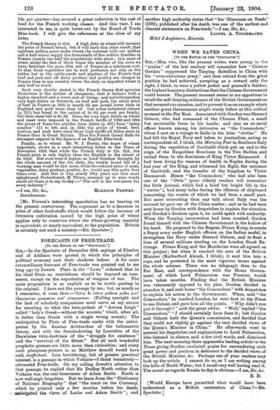[TO THE EDITOR OF THE "SPECTATOR."]
SIR,—Men who, like the present writer, were young in the " sixties " of the last century will remember how Chinese Gordon" suppressed the Taeping Rebellion in China with his "ever-victorious army," and then retired from the great position he had achieved, accepting as a reward only the right, I think, to wear a yellow jacket and peacock's feather, the highest honorary distinctions that the Chinese Government could bestow. The present moment seems to me opportune to recall the self-denying ordinance of the British Government on that momentous occasion, and to present it as an example which another great Government might wisely follow at this critical moment in the Far East. Associated with Gordon was Sherard Osborn, who had command of the Chinese Fleet, a small but serviceable force in his hands ; and also an ex-naval officer known among his intimates as "the Commodore," whom I met on a voyage to India in the later "sixties." He had left the Royal Navy and taken to journalism, acting as correspondent of, I think, the Morning Post in Southern Italy during the expedition of Garibaldi which put an end to the reign of the Neapolitan Bourbons in the Two Sicilies, and united them to the dominions of King Victor Emmanuel. I had been living for reasons of health in Naples during the last year of the King, and witnessed his flight, the entrance of Garibaldi, and the transfer of the kingdom to Victor Emmanuel. Hence "the Commodore," who had also been one of the " Owls " (your elderly readers will remember the little journal, which had a brief but bright life in the " sixties "), had many talks during the idleness of shipboard concerning the events of which we had been a small part. But more interesting than any talk about Italy was the account he gave me of the China matter ; and as he had been sent home by Gordon with despatches to explain the situation and Gordon's decision upon it, he could speak with authority. When the Taeping insurrection had been crushed, Gordon found himself with the Chinese Government in the hollow of his hand. He proposed to the Regent, Prince Kung, to create a Sepoy army under English officers on the Indian model, to strengthen the Navy under Sherard Osborn, and to float a loan of several millions sterling on the London Stock Ex- change. Prince Kung and the Mandarins were all agreed on this project ; but when it reached the ears of the British Minister (Rutherford Alcock, I think), it sent him into a rage, and he protested in the most vigorous terms against the whole scheme. There was no telegraph then to the Far East, and correspondence with the Home Govern- ment, of which Lord Palmerston was Premier, would have taken months. Finding that the British Minister was vehemently opposed to his plan, Gordon decided to abandon it, and sent home "the Commodore "with despatches to explain his action to the Government. When, said "the Commodore," he reached London, he went first to the Times to see Delane, and gave him all the points. "Why didn't you put it through ? " said the great editor. "Well," replied "the Commodore," "I should certainly have done it ; but Gordon and Osborn held the Queen's commission, and decided that they could not rightly go against the very decided views of the Queen's Minister in China." He afterwards went to present his despatches and explanations to Lord Palmerston, who listened in silence, said a few civil words, and dismissed him. The next morning there appeared a leading article in the Times giving Gordon unstinted praise for surrendering such great power and position in deference to the decided views of the British Minister, &c. Perhaps one of your readers may look up the article. I cannot do so, as I am writing among the hills of North Wales ; but I recall very well having read it. The moral as regards Russia to-day is obvious.—I am, Sir, &c.
E. D.
[Would Europe have permitted what would have been understood as a British annexation of China ?—ED. Spectator.]










































 Previous page
Previous page